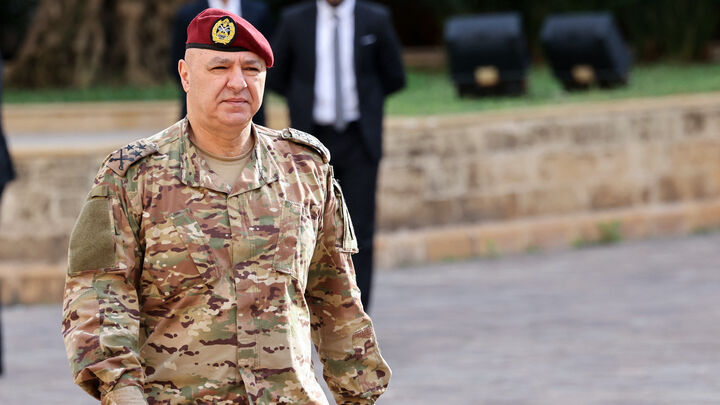Lebanon’s army chief, Gen. Joseph Aoun, was elected president on Thursday after a more than two-year vacuum at the top position in the country amid deepening political rivalries, economic and financial strains and growing instability.
Aoun, who has been commander of the Lebanese Armed Forces since 2017, secured 99 votes out of 128 during the second round of a parliament session called by its speaker, Nabih Berri. During the first round of voting earlier on Thursday, Aoun received 71 votes, short of the 86 required to become president.
Article 49 of the Lebanese constitution prohibits serving government employees and members of the armed forces from running for president unless they secure two-thirds majority of the vote. Aoun therefore required a minimum of 86 parliamentary votes and not just a simple majority (65) to circumvent this rule.
In his first speech to the parliament as president, Aoun pledged to uphold Lebanon’s unity and sovereignty while asserting the state’s exclusive authority over all weapons in the country. “My mandate will emphasize the state’s right to monopolize arms,” he said, without mentioning the Iran-backed Lebanese militant group Hezbollah by name.
The breakthrough followed intense regional and international diplomacy led by the United States, Saudi Arabia, Egypt and others. Thursday’s session followed the implementation of a 60-day ceasefire between Lebanon and Israel brokered by the United States, which took effect on Nov. 27, 2024. The ceasefire, which is up for renewal on Jan. 25, ended a 13-month conflict between Israel and Hezbollah. The Lebanese military plays a central role in implementing the arrangement.
Lebanon has been without a president since October 2022, when the term of Hezbollah-backed President Michel Aoun (no relation) concluded. Since then, the country’s fractured parliament has failed in 12 attempts to elect a new president, leaving Lebanon with a caretaker government operating with limited powers.
Regional and international actors, including Saudi Arabia and the United States, have ramped up diplomatic efforts in an apparent bid to secure the election of Aoun.
As the head of Lebanon’s army, Aoun has built a reputation for personal integrity. Many view him as incorruptible and a stabilizing figure for the nation.
Who is Joseph Aoun?
Aoun was born to a Maronite Christian family in 1964 in the Sin el-Fil suburb of the Metn district, east of the capital Beirut. His family hails from the town of Aishiye in south Lebanon, making him the first president in the history of the republic from that region.
He holds a bachelor’s degree in political science with a focus in international affairs from the Lebanese American University and another bachelor’s in military science, according to the LAF website. In addition to his native Arabic language, Aoun is fluent in English and French.
He is married to Nehmat Nehmeh and together they have two children, Khalil and Nour. The family attended the second round of the vote on Thursday.
Aoun’s military journey began in 1983, when he first enlisted in the army. He was subsequently promoted until he reached the rank of general and was then appointed as the LAF commander in March 2017, succeeding Gen. Jean Kahwaji.
He has had his mandate extended twice: In December 2023, the Lebanese Parliament approved a one-year extension of Aoun’s term. He was scheduled to retire in January 2024. Again, on Nov. 28, 2024, weeks before his tenure was set to expire on Jan. 10, 2025, Aoun’s term was renewed for an additional year.
Aoun underwent intensive military training both in Lebanon and abroad. In 1996, he went to Syria to receive commando training, and then again between October 2002 and April 2003 he trained in the neighboring country to become a battalion commander.
He also attended an international defense management course in the United States in 1999 and another international counter terrorism program between 2008 and 2009.
Military achievements
Aoun’s military career gained prominence in 2015, when he was appointed commander of the 9th Brigade, tasked with operations along the border with Israel. Just a year later, he was reassigned to eastern Lebanon, near the Syrian border, where Islamist militants had established strongholds.
Under his leadership, the LAF led in August 2017 the so-called Fajr al-Joroud battle against the Islamic State and Jabhat al-Nusra in the barren lands (joroud) of Ras Baalbeck and al-Qaa in eastern Lebanon along the border with Syria.
The swift operation, which lasted less than two weeks, saw the killing of more than 150 jihadists, according to the army. A total of seven soldiers were killed in the battles, while the remains of eight soldiers who were kidnapped in 2014 and later executed by ISIS were found in the outskirts of Arsal. Aoun at the time said the military achieved a “decisive victory against terrorism.”
More recently, during the cross-border hostilities between Israel and Hezbollah that erupted on Oct. 8, 2023, the Lebanese Armed Forces maintained a neutral stance. Despite this, the LAF faced attacks on its positions and personnel in southern Lebanon, resulting in the deaths of at least 40 soldiers. The conflict claimed nearly 4,000 lives and left over 16,500 people injured, according to the Lebanese Health Ministry.
